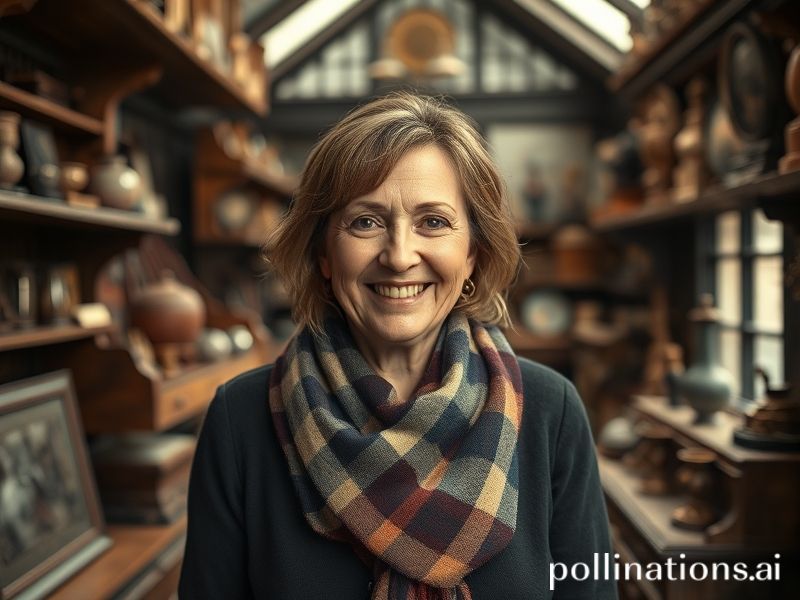How a Scottish Antiques Whisperer Became the Planet’s Accidental Therapist
Roo Irvine and the Global Cottage-Core Arms Race
By Our Man in the Back Row of Antiques Roadshow International
In the grand chessboard of soft-power projection, where nations once hurled missiles and trade tariffs, they now deploy ceramic rabbits and polite Scottish accents. Enter Roo Irvine—ceramicist, antiques expert, and, whether she likes it or not, an unwitting combatant in the worldwide war for cultural reassurance. From her converted cowshed on the Ayrshire coast, she broadcasts the soothing gospel of pre-industrial clutter to an anxious planet that’s simultaneously on fire and binge-watching restoration reels at 1.5× speed.
Irvine’s rise coincides with a curious geopolitical moment: every superpower has discovered that the fastest way to calm an insurrection is to hand it a chipped Blue Willow plate and murmur, “Imagine the stories this could tell.” China recently launched a state-sponsored TikTok channel dedicated to Ming-vase kintsugi, timed perfectly to eclipse coverage of its latest real-estate implosion. Meanwhile, the United States is funding a Netflix docuseries in which Marines refinish Depression-era armoires between drone sorties—call it Hearts, Minds, and Milk Paint.
On the surface, Roo’s job is blissfully small: appraise a 1920s Clarice Cliff teapot, reassure a pensioner that their retirement isn’t entirely fictional, and move on. But zoom out and you’ll see the teapot is a diplomatic asset. When a jittery viewer in São Paulo sees her place a value on battered British crockery, it whispers that tangible things still hold value in a crypto-casino economy. Each “ooh, lovely crackle glaze” is a micro-dose of stability delivered straight to the limbic system.
The numbers back this up. Antique-meme accounts—run by teenagers who can’t legally drink but can spot a Murano glass swan at thirty paces—now reach 200 million eyeballs weekly. Roo, with her trademark tartan scarves and the kind of smile that suggests she’s seen your browser history, is their reluctant queen. UNESCO, ever eager to slap a heritage label on anything that distracts from its budget cuts, just nominated “Rural Scottish Barn Chic” to the Intangible Cultural Assets list, right between Georgian polyphonic singing and Turkish coffee.
Of course, every arms race has its black market. Enterprising Bulgarian forgers now distress IKEA mugs with blowtorches and pigeon droppings, then sell them on eBay as “authentic Irvine-era rustic.” Interpol’s Art Crime Unit—yes, that’s a real thing, and yes, their Christmas party is as bleak as you imagine—reports a 300 % spike in fraudulent “heirloom” tchotchkes. Somewhere in a fluorescent-lit office, an agent is cataloguing fake butter churns and wondering where his life went wrong.
The darker joke is that while Roo gently coaxes history from a shepherd’s crook, actual shepherds are being priced out of the Highlands by Americans who watched her show, swooned, and bought both the crook and the croft it leaned against. The average price of a ruined bothy has tripled since 2019, which means the antiques are safer than the people who once made them. Capitalism’s golden rule: if you can’t sell the past, at least gentrify it.
Yet even cynics must concede the soft-power dividend. Last month, a livestreamed valuation Roo did from her kitchen table—featuring a chipped Beswick fox—was clipped, subtitled in Arabic, and went viral in Riyadh under the hashtag #DesertFoxReborn. Comments ranged from “Allah bless the fox” to “I now believe Britain is more than Brexit and damp.” Soft diplomacy by way of ceramic vulpine; take that, Foreign Office.
So what does it all mean? Simply this: in an age when trust in institutions is measured in negative integers, the planet has turned to a Scottish woman who can date a milk jug by its handle curve. The world isn’t asking Roo Irvine to save it—just to keep talking while it finishes the slow-motion car crash. If the end really is nigh, at least we’ll go out knowing the difference between earthenware and stoneware, which, by current standards, passes for progress.







